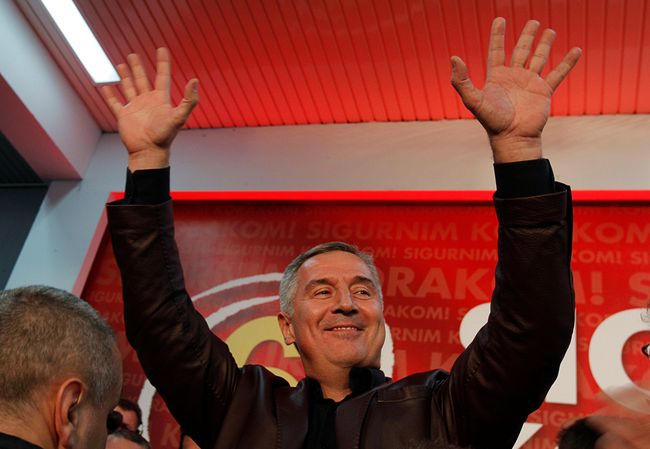No to “Russian colony”
Montenegrins vote to follow the course towards NATO and the EU
Prime Minister Milo Dukanovic’s ruling pro-Western Democratic Party of Socialists won the parliamentary elections in Montenegro past week, gaining 41 percent of votes. It will thus have 35 seats in the 81-seat local parliament. The two leading opposition parties – the Democratic Front and the Key Coalition – won 21 percent and 10.5 percent, i.e., 18 and 9 seats in parliament, respectively. Yet representatives of these parties claim they will have an aggregate 41 seats and, accordingly, form the government, removing Dukanovic who has been ruling the country for 27 years.
Indeed, none of the parties that took part in the elections will have an absolute majority. This means that, as none of them will be able to form a government on their own, there will be a coalition again.
As Tetiana Volkova, Charge d’Affaires of Ukraine in Montenegro, told The Day, if Dukanovic teams up with Democratic Montenegro and the Bosniak Party, they will receive a majority. “The Social Democratic Party is hesitating but seems to be supporting Dukanovic, and the coalition of Albanian parties is also supporting him. All depends on how they will divide seats and unite,” the diplomat said.
Democratic Party of Socialists spokesman Predrag Sekulic told journalists that his party had won the elections again, for a 7th time, and would have, together with its traditional partners, 42 seats in parliament. “I believe the next four years will be marked with our successful policies and a continuing integration,” he emphasized.
According to the election results, the Social Democratic Party, the coalition’s junior partner, and the Bosniak Party have gained two and three seats, respectively, and the Albanian Alternative and the Croatian Civic Initiative – one seat each. If these seats are added to those of Dukanovic’s party, the total number will be 42.
Three coalitions and 14 parties took part in the elections. It is the 10th election since the inception of a multiparty system in the country and the 4th in independent Montenegro, no longer part of a state with Serbia. Montenegro proclaimed independence in 2006 and received the official status of a European Union candidate member in 2010. The country’s population is 623,000. The previous parliamentary elections in Montenegro were held on October 14, 2012.
In May 2016, Montenegro signed a protocol on joining NATO, and now the country has the right to take part in all the Alliance meetings as an observer. When all the NATO states ratify the protocol, Montenegro will be the 29th member of the North Atlantic Treaty Organization. The Democratic Front bloc favors friendship with Russia and demands that the question of NATO membership be put to a national referendum.
This bloc comes out for rapprochement with Russia because it claims that many Montenegrins are dissatisfied with Dukanovic’s course to join NATO. The opposition also accuses the premier of corruption and nepotism, which he denies. Dukanovic in turn accuses the opposition of being funded by Moscow, which it also denies.
So it is no accident that all analysts considered past Sunday’s parliamentary elections in Montenegro as the most important ones since this former Yugoslav republic voted at a referendum to withdraw from the Serbia-Montenegro union 10 years ago.
“Pro-NATO forces win elections in Montenegro today with an astonishing 73-percent turnout despite unprecedented anti-NATO Russian campaign financing,” Damon Wilson, Vice President of the US Atlantic Council, tweeted.
Premier Dukanovic has characterized the Sunday voting as a choice between the country’s EU and NATO membership and turning into a “Russian colony.” Particularly, he said in an interview for EUobserver that Russia is actively working with “strongholds” of anti-EU and anti-NATO sentiment in the Western Balkans in order to compete for influence.
The head of government said the other day that Montenegro would continue its course towards NATO and EU accession. “It was not simple (…), but we did it. We can say with pleasure today that Montenegro is continuing towards its European future,” dpa quotes Dukanovic as saying.
Incidentally, 20 Serbian citizens were arrested on the night before the elections on suspicion of planning attacks on state institutions and officials. Among the arrested is Bratislav Dikic, the former commander of Serbia’s special police force. According to policemen, the arrested planned attacking governmental institutions, police stations, and high-ranking officials after the closure of polling stations on Sunday. The media quote the Police Directorate Chief Slavko Stojanovic as saying that one more citizen of Serbia is wanted.
Besides, some of Montenegro’s media portals, Radio Antena, the website of the Democratic Party of Socialists of Montenegro – Dukanovic’s party – and the telecommunications center were hacked into on the day of voting. “There were failures on Viber, WhatsApp, and Facebook, but they were corrected very fast,” Ms. Volkova told The Day.
It is not ruled out that these hackings were a rehearsal of Russian special services which are, incidentally, accused of hacking into the resources connected with the US Democratic Party shortly before the presidential elections in the United States of America.
Newspaper output №:
№61, (2016)Section
Topic of the Day





